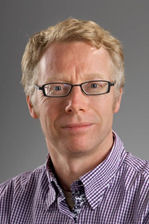Newly appointed GELIFES professor, Martien Kas, announces start of major EU project on brain disorders

Martien Kas has recently been appointed as Professor of Behavioural Neuroscience at the Groningen Institute of Evolutionary Life Sciences (GELIFES) of the University of Groningen. Within the Adaptive Life program, Kas will focus on the neurobiology of adaptive and maladaptive aspects of social behaviour and cognition.
His approach includes the cross-species genetic analyses of neurobiological substrates for maladaptive behaviors of neuropsychiatric disorders. Neuropsychiatric disorders, such as schizophrenia and autism spectrum disorders (ASD), are heritable neurodevelopmental disorders with reduced fecundity, and are characterized by inappropriate behavioral responses to environmental cues. “I focus on the analysis of behavioral strategies, in particular social interaction and behavioral flexibility, which are essential for adaptation.” These studies will lead to our understanding of conserved gene function in regulating essential behavioral strategies and will ultimately improve therapeutic and preventive strategies to contribute to healthy aging.
Kas is the project coordinator of a large EU Innovative Medicine Initiative (IMI) project that aims to unpick the biological reasons underlying social withdrawal, which is a common early symptom of, Schizophrenia, Alzheimer’s disease and Major Depressive Disorder. The PRISM project (Psychiatric Ratings using Intermediate Stratified Markers) started on April 1st, and is a EUR €16.5 million public-private cooperation, uniting researchers from European academic centres, and major pharmaceutical companies.
The start of the project was announced in this weeks’ issue of Science.
| Last modified: | 01 February 2017 12.45 a.m. |
More news
-
25 April 2025
Leading microbiologist Arnold Driessen honoured
On 25 April 2025, Arnold Driessen (Horst, the Netherlands, 1958) received a Royal Decoration. Driessen is Professor of Molecular Microbiology and chair of the Molecular Microbiology research department of the Faculty of Science and Engineering at the...
-
24 April 2025
Highlighted papers April 2025
The antimalarial drug mefloquine could help treat genetic diseases such as cystic fibrosis, Duchenne muscular dystrophy, as well as some cancers.
-
22 April 2025
Microplastics and their effects on the human body
Professor of Respiratory Immunology Barbro Melgert has discovered how microplastics affect the lungs and can explain how to reduce our exposure.
